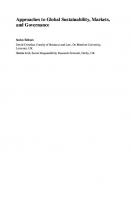Governance and Sustainability: International Perspectives 9789811563690
This book explores the concepts of sustainability and governance in relation to the governance of corporations – hence t
402 78 4MB
English Pages 292 [281] Year 2020
Table of contents :
Acknowledgements
Contents
Contributors
1 The Continuing Development of Governance: International Divergences
1.1 Introduction
1.2 Globalisation
1.3 Financial Globalisation
1.4 Regulation and the Organisation of International Trading
1.5 Global Regulatory Bodies
1.6 The Need for Regulation
1.7 Governance and Regulation
1.8 The Idea of Global Governance
1.9 Conclusions
References
Part ILegal and Regulatory Aspects
2 Incorporating CSR in Corporate Governance of Banking Institutions in a Challenging Institutional Context: A Case Study of Nigeria
2.1 Introduction
2.2 The Debate Underpinning CSR and Corporate Governance
2.2.1 Definition of CSR
2.2.2 Definition of Corporate Governance
2.2.3 The Nexus Between CSR and Corporate Governance
2.3 Theories of Corporate Governance
2.3.1 Agency Theory
2.3.2 Stewardship Theory
2.3.3 Stakeholders Theory
2.3.4 Institutional Theory
2.3.5 Nigerian Banks CSR Initiatives
2.4 Recommendation
2.5 Conclusion
Bibliography
3 Proposing CSR Provisions in Kuwaiti Legal Vision: A Middle-Ground Between UK and Indian Companies Law
3.1 CSR Practices in Kuwait
3.2 CSR in Kuwaiti Company Law and Corporate Governance
3.3 Board of Directors
3.4 CSR Reporting and Information Disclosure
3.5 Corporate Constituencies
3.6 Directors’ Duties
3.7 Corporate Objectives
3.8 Conclusion
4 Sustainable and Smart System: Rethinking Accounting and Taxation in Portugal
4.1 Introduction
4.2 Methodology
4.3 Empirical Analysis
4.4 Discussion
References
5 The Impact of Corporate Governance on Earnings Management of Portuguese Listed Firms
5.1 Introduction
5.2 Literature Review and Hypothesis
5.2.1 Corporate Governance
5.2.2 Earnings Management
5.2.3 Relationship Between Corporate Governance and Earnings Management
5.3 Sample and Methodology
5.3.1 Sample
5.3.2 Models
5.4 Results
5.5 Conclusion
References
6 Legislating South African CSR Through Framework Legislation
6.1 Introduction
6.2 General Trends in CSR or CSR-Related Instruments
6.2.1 Health and Safety
6.2.2 Natural Environment
6.2.3 Labour and Employment
6.2.4 Community Involvement and Development
6.2.5 Skills Development and Education
6.2.6 Consumer Relationships and Stakeholder Management
6.2.7 Human Rights (Including the Prohibition of Discrimination)
6.2.8 Compliance and Reporting
6.2.9 Socio-economic Development
6.2.10 Corporate Citizenship
6.2.11 Preferential Procurement and Enterprise Development
6.2.12 Management System
6.3 Framework Legislation in General
6.3.1 The Nature and Scope of Framework Legislation
6.3.2 The Advantages of Framework Legislation
6.4 The Draft Corporate Social Responsibility Act
6.4.1 Content of the Draft Act
6.5 Conclusion
References
7 Financial Integration: The Tunisian Context
7.1 Introduction
7.2 Theoretical Framework
7.3 Empirical Approach
7.3.1 Data
7.3.2 Description of the Sample
7.3.3 Origin and Frequency of Data
7.3.4 Econometric Software and Techniques Used
7.3.5 Stationarity Tests: The ADF Test
7.3.6 ARMA Model Estimation
7.3.7 Criterion for Choosing the Model
7.4 Methodology Adopted: Presentation of the Model
7.4.1 Estimation with Rolling OLS
7.4.2 Multivariate Analyzes: CCC-GARCH Model Estimation
7.4.3 Economic and Financial Interpretations of the Results
7.5 Conclusion
References
8 CSR, Corporate Heritage Identity and Social Learning
8.1 Introduction
8.2 Identity Perspectives of CSR and Social Learning
8.2.1 Balmer and Soenen’s AC2ID Test Framework: A Morphogenetic Approach
8.3 Corporate Identity Management
8.4 Conceptual Framework
8.5 Application of the Framework
8.6 Methods
8.7 Surfacing Situated Social Learning Capabilities in Contested CSR Terrains
8.8 Structure
8.9 Interaction
8.10 Structural Elaboration
8.11 Conclusion
References
Part IIThe International Dimension
9 Features of Functioning of Corporate Entrepreneurial Structures in Agribusiness of Belarus
9.1 Introduction
9.2 The Specifics of Agribusiness in Belarus
9.3 Formation of the Corporate Sector in the Agribusiness of Belarus
9.4 Capitalization as a Criterion for the Effectiveness of the Functioning of Corporations in Belarus
9.5 Conclusions
References
10 Workplace Bullying: A Critical Look at Legal Protection in Brazil and Portugal
10.1 Introduction
10.2 Theoretical Reference
10.2.1 Critical Thinking
10.2.2 Workplace Bullying in Portugal
10.2.3 Legal Protection in Portugal
10.2.4 Workplace Bullying in Brazil
10.2.5 Legal Protection in Brazil
10.2.6 Methodology
10.2.7 Final Considerations
References
11 Influence of Gender Diversity of Boards and Gender of CEO on Financial Performance: The European Case
11.1 Introduction
11.2 Part I—Literature Review
11.3 Evolution of Women in the Labor Market
11.4 The CEO Gender
11.5 The Board of Directors
11.6 The Effects of Gender Quotas on Business
11.7 Current Situation of the European Union
11.8 Empirical/Previous Studies
11.9 United States of America
11.10 Europe
11.11 Rest of the World
11.12 Part II—Sample and Metodology
11.12.1 Sample
11.13 Variables
11.13.1 Dependent Variables
11.14 ROA
11.15 Q of Tobin
11.16 Independent Variables
11.17 FEMALECEO
11.18 FEMALEONBOARD
11.19 Control Variables
11.20 Regression Models
11.21 Part III—Results
11.21.1 Descriptive Statistics
11.22 Correlations
11.23 Discussion
11.24 ROA
11.25 Q of Tobin
11.26 Concluding Remarks and Future Research
11.27 Conclusions
References
12 Ethics of Sugar Cane Farming and Crushing in Maharashtra
12.1 Introduction
12.2 Agriculture in Maharashtra and Contribution of Sugar Cane Farming
12.3 Irrational Location of Sugar Mills and Concentration of Sugar Farming
12.4 The Plight of the Common Man
12.5 Impact of Climate Change
12.6 Sustainability of Sugar Farming in Maharashtra
12.7 Corrective Actions Are Undertaken/Proposed
12.8 Is It Ethical?
12.9 The Factual Scenario of the Case
12.10 Ethical Dilemma
12.11 Solution to Ethical Dilemma: Closing of the Sugar Farming and Sugar Mills
12.12 Conclusion
References
13 Review of CSR—Corporate Social Responsibility Initiatives of the Top Three CPSE’s—Central Public Sector Enterprises of India
13.1 Introduction
13.2 Research Methodology
13.3 Review of Literature
13.4 Corporate Social Responsibility in India
13.5 Central Public Sector Enterprises (CPSEs)
13.6 Schedule VII of Companies Act 2013, (Section 135)
13.7 CORPORATE SOCIAL RESPONSIBILITY AMONG CPSEs—Central Public Sector Enterprises
13.8 Data Analysis & Interpretations
13.9 Trend Analysis: Budgeted Components Versus Total Budget
13.10 Trend Analysis: CSR Spent Component Versus Total Spent
13.11 Over/Under Spendings on CSR
13.12 Findings & Conclusions
13.13 Web Resources
References
Acknowledgements
Contents
Contributors
1 The Continuing Development of Governance: International Divergences
1.1 Introduction
1.2 Globalisation
1.3 Financial Globalisation
1.4 Regulation and the Organisation of International Trading
1.5 Global Regulatory Bodies
1.6 The Need for Regulation
1.7 Governance and Regulation
1.8 The Idea of Global Governance
1.9 Conclusions
References
Part ILegal and Regulatory Aspects
2 Incorporating CSR in Corporate Governance of Banking Institutions in a Challenging Institutional Context: A Case Study of Nigeria
2.1 Introduction
2.2 The Debate Underpinning CSR and Corporate Governance
2.2.1 Definition of CSR
2.2.2 Definition of Corporate Governance
2.2.3 The Nexus Between CSR and Corporate Governance
2.3 Theories of Corporate Governance
2.3.1 Agency Theory
2.3.2 Stewardship Theory
2.3.3 Stakeholders Theory
2.3.4 Institutional Theory
2.3.5 Nigerian Banks CSR Initiatives
2.4 Recommendation
2.5 Conclusion
Bibliography
3 Proposing CSR Provisions in Kuwaiti Legal Vision: A Middle-Ground Between UK and Indian Companies Law
3.1 CSR Practices in Kuwait
3.2 CSR in Kuwaiti Company Law and Corporate Governance
3.3 Board of Directors
3.4 CSR Reporting and Information Disclosure
3.5 Corporate Constituencies
3.6 Directors’ Duties
3.7 Corporate Objectives
3.8 Conclusion
4 Sustainable and Smart System: Rethinking Accounting and Taxation in Portugal
4.1 Introduction
4.2 Methodology
4.3 Empirical Analysis
4.4 Discussion
References
5 The Impact of Corporate Governance on Earnings Management of Portuguese Listed Firms
5.1 Introduction
5.2 Literature Review and Hypothesis
5.2.1 Corporate Governance
5.2.2 Earnings Management
5.2.3 Relationship Between Corporate Governance and Earnings Management
5.3 Sample and Methodology
5.3.1 Sample
5.3.2 Models
5.4 Results
5.5 Conclusion
References
6 Legislating South African CSR Through Framework Legislation
6.1 Introduction
6.2 General Trends in CSR or CSR-Related Instruments
6.2.1 Health and Safety
6.2.2 Natural Environment
6.2.3 Labour and Employment
6.2.4 Community Involvement and Development
6.2.5 Skills Development and Education
6.2.6 Consumer Relationships and Stakeholder Management
6.2.7 Human Rights (Including the Prohibition of Discrimination)
6.2.8 Compliance and Reporting
6.2.9 Socio-economic Development
6.2.10 Corporate Citizenship
6.2.11 Preferential Procurement and Enterprise Development
6.2.12 Management System
6.3 Framework Legislation in General
6.3.1 The Nature and Scope of Framework Legislation
6.3.2 The Advantages of Framework Legislation
6.4 The Draft Corporate Social Responsibility Act
6.4.1 Content of the Draft Act
6.5 Conclusion
References
7 Financial Integration: The Tunisian Context
7.1 Introduction
7.2 Theoretical Framework
7.3 Empirical Approach
7.3.1 Data
7.3.2 Description of the Sample
7.3.3 Origin and Frequency of Data
7.3.4 Econometric Software and Techniques Used
7.3.5 Stationarity Tests: The ADF Test
7.3.6 ARMA Model Estimation
7.3.7 Criterion for Choosing the Model
7.4 Methodology Adopted: Presentation of the Model
7.4.1 Estimation with Rolling OLS
7.4.2 Multivariate Analyzes: CCC-GARCH Model Estimation
7.4.3 Economic and Financial Interpretations of the Results
7.5 Conclusion
References
8 CSR, Corporate Heritage Identity and Social Learning
8.1 Introduction
8.2 Identity Perspectives of CSR and Social Learning
8.2.1 Balmer and Soenen’s AC2ID Test Framework: A Morphogenetic Approach
8.3 Corporate Identity Management
8.4 Conceptual Framework
8.5 Application of the Framework
8.6 Methods
8.7 Surfacing Situated Social Learning Capabilities in Contested CSR Terrains
8.8 Structure
8.9 Interaction
8.10 Structural Elaboration
8.11 Conclusion
References
Part IIThe International Dimension
9 Features of Functioning of Corporate Entrepreneurial Structures in Agribusiness of Belarus
9.1 Introduction
9.2 The Specifics of Agribusiness in Belarus
9.3 Formation of the Corporate Sector in the Agribusiness of Belarus
9.4 Capitalization as a Criterion for the Effectiveness of the Functioning of Corporations in Belarus
9.5 Conclusions
References
10 Workplace Bullying: A Critical Look at Legal Protection in Brazil and Portugal
10.1 Introduction
10.2 Theoretical Reference
10.2.1 Critical Thinking
10.2.2 Workplace Bullying in Portugal
10.2.3 Legal Protection in Portugal
10.2.4 Workplace Bullying in Brazil
10.2.5 Legal Protection in Brazil
10.2.6 Methodology
10.2.7 Final Considerations
References
11 Influence of Gender Diversity of Boards and Gender of CEO on Financial Performance: The European Case
11.1 Introduction
11.2 Part I—Literature Review
11.3 Evolution of Women in the Labor Market
11.4 The CEO Gender
11.5 The Board of Directors
11.6 The Effects of Gender Quotas on Business
11.7 Current Situation of the European Union
11.8 Empirical/Previous Studies
11.9 United States of America
11.10 Europe
11.11 Rest of the World
11.12 Part II—Sample and Metodology
11.12.1 Sample
11.13 Variables
11.13.1 Dependent Variables
11.14 ROA
11.15 Q of Tobin
11.16 Independent Variables
11.17 FEMALECEO
11.18 FEMALEONBOARD
11.19 Control Variables
11.20 Regression Models
11.21 Part III—Results
11.21.1 Descriptive Statistics
11.22 Correlations
11.23 Discussion
11.24 ROA
11.25 Q of Tobin
11.26 Concluding Remarks and Future Research
11.27 Conclusions
References
12 Ethics of Sugar Cane Farming and Crushing in Maharashtra
12.1 Introduction
12.2 Agriculture in Maharashtra and Contribution of Sugar Cane Farming
12.3 Irrational Location of Sugar Mills and Concentration of Sugar Farming
12.4 The Plight of the Common Man
12.5 Impact of Climate Change
12.6 Sustainability of Sugar Farming in Maharashtra
12.7 Corrective Actions Are Undertaken/Proposed
12.8 Is It Ethical?
12.9 The Factual Scenario of the Case
12.10 Ethical Dilemma
12.11 Solution to Ethical Dilemma: Closing of the Sugar Farming and Sugar Mills
12.12 Conclusion
References
13 Review of CSR—Corporate Social Responsibility Initiatives of the Top Three CPSE’s—Central Public Sector Enterprises of India
13.1 Introduction
13.2 Research Methodology
13.3 Review of Literature
13.4 Corporate Social Responsibility in India
13.5 Central Public Sector Enterprises (CPSEs)
13.6 Schedule VII of Companies Act 2013, (Section 135)
13.7 CORPORATE SOCIAL RESPONSIBILITY AMONG CPSEs—Central Public Sector Enterprises
13.8 Data Analysis & Interpretations
13.9 Trend Analysis: Budgeted Components Versus Total Budget
13.10 Trend Analysis: CSR Spent Component Versus Total Spent
13.11 Over/Under Spendings on CSR
13.12 Findings & Conclusions
13.13 Web Resources
References

![Governance and Sustainability: International Perspectives [1st ed.]
9789811563690, 9789811563706](https://ebin.pub/img/200x200/governance-and-sustainability-international-perspectives-1st-ed-9789811563690-9789811563706.jpg)








